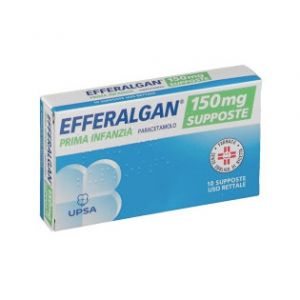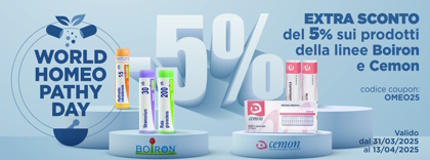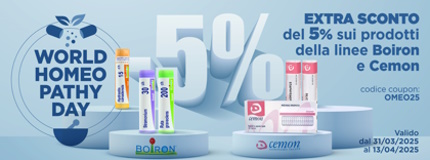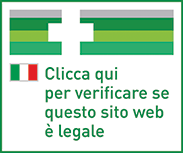Ship in Europe, Find out rates!
Efferalgan Early Childhood 150 mg Paracetamol 10 Suppositories

- box Delivery in Italy in 24/48 and free returns
- star3.000+ positive reviews
- dropboxOver 60,000 products in the catalog
Pediatric suppositories for rectal use containing paracetamol .
Therapeutic indications
Efferalgan Early Childhood is used in the symptomatic treatment of mild to moderate pain and febrile conditions in children.
Dosage and posology
The suppositories of Efferalgan Early Childhood 150 mg in children must be respected the dosage schedules based on body weight and consequently it is necessary to choose the suitable formulation. The correlation between age and weight is only indicative. Due to the risk of local toxicity, the administration of suppositories more than 4 times a day is not recommended and the duration of rectal treatment should be as short as possible. It is not recommended to administer suppositories in case of diarrhea.
This formulation is reserved for children with a body weight between 8 kg and 13 kg (aged between approximately 6 months and 2 years). The dosage is one suppository of 150 mg, to be repeated, if necessary, after an interval of at least 6 hours, without exceeding 3 suppositories for children weighing less than 10 kg and 4 suppositories per day for children weighing equal to or greater. to 10 kg.
Overdose
There is a risk of intoxication, especially in patients with liver disease, in chronic alcoholism, in patients with chronic malnutrition, and in patients receiving enzyme inducers. In these cases, overdose can be fatal. Symptoms usually appear within the first 24 hours and include: nausea, vomiting, anorexia, paleness, malaise and diaphoresis. Overdose with acute ingestion of 7.5 g or more of paracetamol in adults and 140 mg / kg body weight in children causes hepatic cytolysis which can progress to complete and irreversible necrosis resulting in hepatocellular failure, metabolic acidosis and encephalopathy which can lead to coma and death. At the same time, increased levels of hepatic transaminases (AST, ALT), lactate dehydrogenase and bilirubin are observed, together with a decrease in the prothrombin value which may occur 12 to 48 hours after administration. Clinical symptoms of liver damage usually manifest themselves after one or two days, and reach their maximum after 3 - 4 days.
Contraindications
- Hypersensitivity to paracetamol or propacetamol hydrochloride (precursor of paracetamol) or to any of the excipients.
- Severe hepatocellular insufficiency and active liver disease.
- Paracetamol medicines are contraindicated in patients with severe haemolytic anemia.
Side effects
Skin reactions of various types and severities have been reported with the use of paracetamol including cases of erythema multiforme, Stevens-Johnson syndrome and epidermal necrolysis. Hypersensitivity reactions such as angioedema, laryngeal edema, anaphylactic shock have been reported. In addition, the following undesirable effects have been reported: thrombocytopenia, leukopenia, anemia, agranulocytosis, liver function abnormalities and hepatitis, kidney disorders (acute renal failure, interstitial nephritis, haematuria, anuria), gastrointestinal reactions and dizziness.
Special warnings
High or prolonged doses of the product can cause high-risk liver disease and alterations, even serious ones, to the kidney and blood. Do not administer during chronic treatment with drugs that can determine the induction of hepatic monooxygenases or in case of exposure to substances that can have this effect. Paracetamol should be administered with caution in subjects with renal (creatinine clearance ≤ 30 ml / min) or hepatic impairment. In case of allergic reactions the administration should be suspended. Use with caution in case of chronic alcoholism, excessive alcohol intake (3 or more alcoholic drinks per day), anorexia, bulimia or cachexia, chronic malnutrition (low reserves of hepatic glutathione), dehydration, hypovolemia. Use with caution in subjects with glucose-6-phosphate dehydrogenase deficiency. During treatment with paracetamol, before taking any other drug, check that it does not contain the same active ingredient, as serious adverse reactions can occur if paracetamol is taken in high doses. Instruct the patient to contact the physician before associating any other medication. In case of prolonged use it is advisable to monitor liver and kidney function and blood count. In case of allergic reactions the administration should be suspended.
High or prolonged doses of the product can cause high-risk liver disease and alterations, even serious ones, to the kidney and blood. Do not administer during chronic treatment with drugs that can determine the induction of hepatic monooxygenases or in case of exposure to substances that can have this effect.
Expiry and retention
Check the expiration date indicated on the package. The expiry date indicated on the package refers to the product in intact packaging, correctly stored. Do not store above 30 ° C.
Warning : do not use the medicine after the expiry date indicated on the package.
Composition
Each suppository of Efferalgan Early Childhood contains:
Active principle
Paracetamol 150 mg.
Excipients
Semi-synthetic glycerides.


